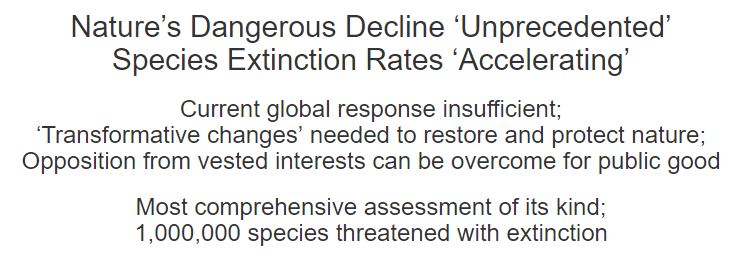In a surprisingly stark message even by UN standards, the latest report from the Intergovernmental Science-Policy Platform on Biodiversity and Ecosystem Services (IPBES), a UN committee, predicts the extinction of a million species due to human activities

Headlines from IPBES Report
The report, by the
Intergovernmental Science-Policy Platform on Biodiversity and Ecosystem Services (IPBES), a UN committee, makes no bones about where the blame lies. With human activity. An increasing population, coupled with unbridled or even helpless consumption growth is wiping out species literally every hour, with massive implications for long term human survival too.
Shrinking habitat, exploitation of natural resources, climate change and pollution are key drivers of this unprecedented rate of loss, that threatens over 40% of amphibians, 33% of coral reefs and over a third of all marine mammals with a wipeout today, the IPBES report said.
Sir Robert Watson, IPBES chair, says that “transformative change” is needed to save the planet. Changes that would need to necessarily cover all areas of government, revised trade rules, massive investments in forests and other green infrastructure, and changes in individual behaviour such as
lower consumption of meat and material goods.The report comes even as Greta Thunberg, the 16 year old who has been at the forefront of a demand to declare a climate emergency, marveled at how life goes on as normal, even as we effectively create an armageddon for millions of the Earth’s species that have shared the planet with us.
The authors hope, that the report would galvanise action in a way climate breakdown has surged up the political agenda since the 1.5C report last year by the UN Intergovernmental Panel on Climate Change. the report comes in a week where headlines have announced the UK declaring climate emergency, along with the contrarian news of a pause on renewables growth in 2018.
India offers a perfect example of the challenges to drastic measures. From the obvious slowdown democratic processes entail, to the fact of a massive chunk of population that is already deprived, and finally, the question of recovering investments from polluting assets in the energy ecosystem on its own.
It’s obvious that the lead will have to be taken by the developed world, even as the developing world focuses on immediate measures in areas like conservation of woodlands, forests, and better water management. With the developed world seemingly addicted to capital at low cost, and ageing societies that seem fiercely resistant to change, preferring perhaps to kick the can to the next generation, it’s a tough challenge indeed.
(Visited 239 times, 1 visits today)
 Headlines from IPBES Report
Headlines from IPBES Report




